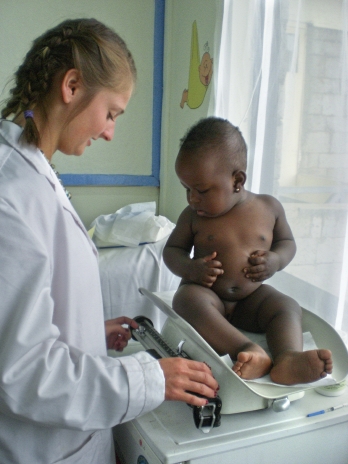COVER STORY
Cornell's global citizens roll up their sleeves and tackle real-world problems

Ginger Golub, a senior nutrition major and global health minor in the College of Human Ecology, weighs a baby at the Nairobi Women s Hospital s new well-baby clinic in Kenya in 2007. See larger image
The Tata Trust has also provided $25 million in funding for the Tata-Cornell Initiative in Agriculture and Nutrition. "The goals of this project are to reduce poverty and malnutrition in rural India," says Pell, who leads the initiative in agriculture and nutrition. "Initially, we will work with Indian partners in central India in areas where there is a lot of poverty."
Attracting people who care
Opportunities to do field research and help people are a key drawing card for many researchers to seek out Cornell. They "want to see their work benefit people," says Ronnie Coffman, director of international programs for CALS and the Durable Rust Resistance in Wheat project. "They are not satisfied just to work in the abstract, to simply publish papers, but they are interested in improving the lives of people around the world. That's always been the culture of our college and the institution at-large."
Pell concurs: "The problems that faculty try to solve are intellectually interesting, and finding reasonable solutions for problems, like water shortages, for example, is imperative. There's a feeling of being relevant and there is an altruism of wanting the world to be better when we leave it."
Take the Emerging Markets Program in the Department of Applied Economics and Management. In one aspect of the program, students serve as marketing and business consultants for small businesses in west and southern Africa. The program's influence goes beyond whether local businesses succeed or not, says economist Christy, the program's director. "We have to look at doing good in the world," he says. "We have to look at assisting developing countries and helping grow their economies and making their communities more prosperous."
Graduate student Megan Hatch calls her trip to Kenya with the program "one of the most rewarding experiences I have had at Cornell." She adds, "I think I learned more about agriculture and business from this real-life case study than I did from most of my other classes."
In more subtle ways, Qi Wang, associate professor of human development in the College of Human Ecology, sees aiding intercultural understanding as another way of improving the world. She collaborates with psychologists at Peking University to explore how culture shapes personal memories and identities. Recently, when several of her students interviewed bilingual Chinese children in China, they found that when interviewed in English, the children reflected more American ideals like strong individualism. But when they were interviewed in Chinese, they conveyed Chinese values like belonging to a group.